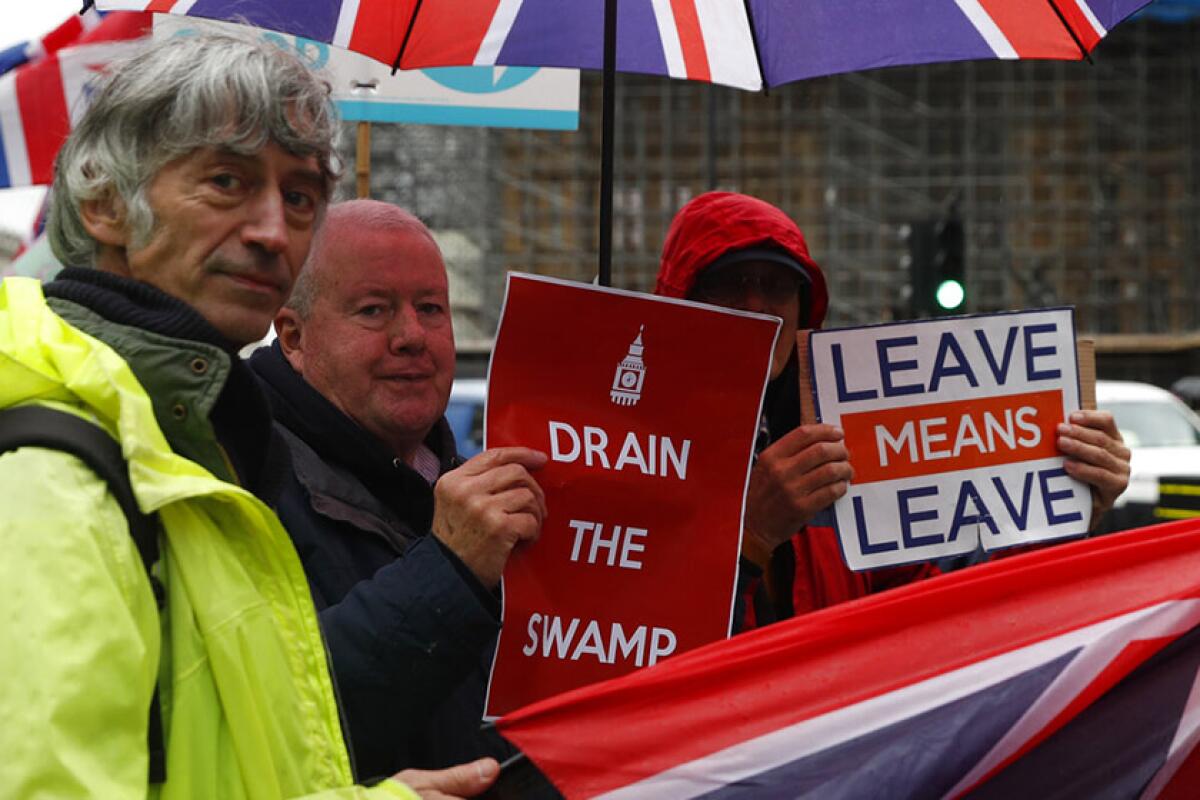Boris Johnson threatens a new election if lawmakers delay Brexit action

- Share via
LONDON — British Prime Minister Boris Johnson is headed for a showdown Tuesday with lawmakers who want to put the brakes on his drive to push his European Union divorce bill through the House of Commons in just three days and take Britain out of the EU by Oct. 31.
Johnson says if Parliament imposes a longer timetable and “decides to delay everything until January or possibly longer,” he will withdraw the bill and call a vote on holding a snap general election.
“I will in no way allow months more of this,” said Johnson, who took power in July vowing that the U.K. would leave the EU on Oct. 31, come what may. His only hope of doing that is to pass the Brexit-implementing bill through Britain’s fractious Parliament before then.
Johnson’s announcement piles pressure on lawmakers as they consider whether to approve the government’s legislation, which would finally take Britain out of the EU more than three years after voters opted to leave the bloc.
The bill faces two votes Tuesday, with lawmakers first being asked to approve it in principle, followed by a vote on the government’s schedule for debate and possible amendments.
Johnson said backing the bill would allow lawmakers to “turn the page and allow this Parliament and this country to begin to heal and unite.”
Although many analysts expect the bill to be approved, lawmakers may reject the three-day timetable because of concerns it doesn’t provide enough time for scrutiny of the 115-page document, which sets out the terms of Britain’s departure from the 28-nation bloc.
Major bills usually take weeks or months to pass through Parliament, giving time for line-by-line scrutiny by lawmakers.
Green lawmaker Caroline Lucas tweeted that lawmakers “had more time to debate the Wild Animals in Circuses Act [affecting 19 animals] than they will to decide the future of 65 million people. It’s hard to think of anything which better illustrates this Govt’s contempt for people, Parliament & democracy.”
Ominously for the government, some lawmakers who support the Brexit deal said they would vote against the short timetable.
“Unless you are prepared to contemplate more expansive debate, there is not the slightest possibility of considering the deal that has been obtained within the time available,” Ken Clarke, a senior lawmaker recently ousted from Johnson’s Conservative Party group in Parliament, told the Guardian newspaper.
The showdown comes just nine days before Britain’s scheduled departure date. Johnson’s government had sought a “straight up-and-down vote” Monday on the agreement he struck last week with the 27 other EU nations laying out the terms of Britain’s exit.
But the speaker of the House of Commons, John Bercow, refused to allow it because lawmakers voted to delay approving the Brexit deal on Saturday, and parliamentary rules bar the same measure from being considered a second time during a session of Parliament unless something has changed.
Bercow’s ruling plunged the torturous Brexit process back into grimly familiar territory: acrimonious uncertainty.
Johnson’s Conservatives hold just 288 of the 650 House of Commons seats, so he will need support from opposition and independent lawmakers to pass the bill — if, that is, Parliament approves the timetable on Tuesday.
The bill turns the deal Johnson struck with the EU into law. It sets out the terms of Britain’s departure, including measures to maintain an open border between the U.K.’s Northern Ireland and EU member Ireland. It also enshrines the right of U.K. and EU citizens living in the other’s territory to continue with their lives, and sets out the multibillion-dollar payments Britain must make to meet its financial obligations to the EU.
It also confirms a transition period lasting until at least the end of 2020 — and possibly 2022 — in which relations will remain frozen as they are now while a permanent new relationship is worked out.
Opposition lawmakers plan to seek amendments that could substantially alter the bill by, for example, adding a requirement that the Brexit deal be put to voters in a new referendum, or by requiring the government to extend the transition period until a new trade deal with the EU has been agreed on.
The government says such major amendments would wreck its legislation and that it will withdraw the bill if the opposition plan succeeds.
With the Brexit deadline looming and British politicians still squabbling over the country’s departure terms, Johnson asked the EU for a three-month delay to Britain’s departure date.
He did that, grudgingly, to comply with a law passed by Parliament ordering the government to postpone Brexit rather than risk the economic damage that could come from a no-deal exit.
European Council President Donald Tusk said Tuesday that EU leaders would “decide in coming days” whether to grant Britain another extension to the deadline for leaving the bloc but said their decision depended on developments in London.
Tusk said Tuesday that the decision on prolonging Brexit for three months after Oct. 31 would “very much depend on what the British Parliament decides or doesn’t decide.”
More to Read
Sign up for Essential California
The most important California stories and recommendations in your inbox every morning.
You may occasionally receive promotional content from the Los Angeles Times.













